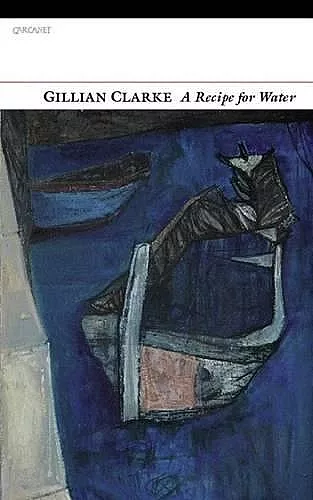A Recipe for Water
Format:Paperback
Publisher:Carcanet Press Ltd
Published:28th Apr '09
Should be back in stock very soon

The drop of water on the tongue, writes Gillian Clarke, 'was the first word in the world', and the language of water is the element in which these poems live. Ocean currents create histories and cultures - the port cities of Cardiff and Mumbai; myths are born where great rivers have their source high in the mountains. A bottle of spring water contains the mineral elements of life; we can read the earth's deep history in arctic ice. We share the rhythms of migrations in the pull of tides and seasons through rivers and estuaries.
In her first collection since becoming the National Poet of Wales in 2008, Gillian Clarke explores water as memory and meaning, the bearer of stories that well up from a personal and collective past to return us to the language of the imagination in which we first named the world.
Welsh poets may still sense a bardic responsibility to speak for their communities. The relatively new post of national poet, currently held by Gillian Clarke, arises naturally from that tradition. Happily for the incumbent, it brings none of the royalist freight attached to the English ‘laureate’ brand, but there are other pressing expectations. Academi, which sponsors the post, lists on its website the required skills, including ‘an ability to communicate, to write well and often, and to have a regular route into the magic that makes verse work’. This is an un-nerving job description - not least, that surely mischievous oxymoron, ‘regular route into the magic ... ‘
Clarke's new collection, A Recipe for Water, is surprisingly upbeat and relaxed in tone. An array of sequences testifies to her creative energy, and, notwithstanding concerns over climate change, there is plenty of celebration. At the same time, some over familiar recipes are revisited. The ‘myth kitty’ (or is it a nature reserve?) of contemporary poetry yields various recycled ingredients: a fox cub brought home in a jacket, the shipping forecast and, not least, the collection's dominant theme, water.
Dedicated to the Indian poet Sujata Bhatt, the title sequence registers ecological urgency through the experience of a drought closer to home: ‘You imagine me writing in the falling rain /... But day after day / no huff of rain / on the roof ... ‘ The use of ‘huff’, with its alliterative echo, ‘roof’, is beautifully exact; Welsh rain inevitably announces itself in gusts of angry wind. Clarke returns to a favourite analogy, water as vocalisation, but broadens the linguistic dimension with ‘wysg, uisc, dwr, hudra, aqua, agua, eau, wasser’. Listing seems a rather over-used device, though led by a good ear for euphony. Later in the collection, there's more notably spectacular poetic weather, vivid with ‘bucking calves’, squally winds that ‘shove and shoulder’, and the strange yellow glow of a landscape bathed in ominous ‘storm-light’ (‘Cattle, Hayfield, Storm’).
Immediacy is Clarke's forte, but what is effective aurally, and allows audiences to appreciate hearing a poem without suspecting most of it has been left stranded on the page, may seem low-pressure in print. Sometimes, the language is plain to the point of the unabashed commonplace (‘brand new’, ‘who dares / wins’, ‘house of dreams’). On the positive side, the poetic structures have a natural rhythm and flow, and the alliterative effects add interest to the texture.
The urban poems reflecting Clarke's earlier stint as Cardiff's laureate add zest to the collection, capturing big-city flux and buzz with plenty of sonic colour: ‘Buildings you knew / fall to rubble and ash / under the crush of machines,
ISBN: 9781857549881
Dimensions: 216mm x 135mm x 8mm
Weight: 91g
96 pages